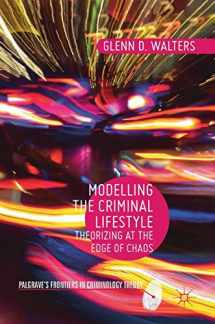
Modelling the Criminal Lifestyle: Theorizing at the Edge of Chaos (Palgrave's Frontiers in Criminology Theory)
ISBN-13:
9783319577708
ISBN-10:
3319577700
Edition:
1st ed. 2017
Author:
Glenn D. Walters
Publication date:
2017
Publisher:
Palgrave Macmillan
Format:
Hardcover
317 pages
Category:
Personality
,
Psychology & Counseling
,
Behavioral Sciences
,
Criminology
,
Social Sciences
FREE US shipping
Book details
ISBN-13:
9783319577708
ISBN-10:
3319577700
Edition:
1st ed. 2017
Author:
Glenn D. Walters
Publication date:
2017
Publisher:
Palgrave Macmillan
Format:
Hardcover
317 pages
Category:
Personality
,
Psychology & Counseling
,
Behavioral Sciences
,
Criminology
,
Social Sciences
Summary
Modelling the Criminal Lifestyle: Theorizing at the Edge of Chaos (Palgrave's Frontiers in Criminology Theory) (ISBN-13: 9783319577708 and ISBN-10: 3319577700), written by authors
Glenn D. Walters, was published by Palgrave Macmillan in 2017.
With an overall rating of 3.9 stars, it's a notable title among other
Personality
(Psychology & Counseling, Behavioral Sciences, Criminology, Social Sciences) books. You can easily purchase or rent Modelling the Criminal Lifestyle: Theorizing at the Edge of Chaos (Palgrave's Frontiers in Criminology Theory) (Hardcover) from BooksRun,
along with many other new and used
Personality
books
and textbooks.
And, if you're looking to sell your copy, our current buyback offer is $0.3.
Description
This book offers Walters's latest evolution of criminal lifestyle theory. It introduces the concept of criminal thought content to illustrate how the potential interplay between what offenders think and their thought processes can greatly aid our understanding of both crime and criminals. In this new study on criminal behaviour, Walters calls for criminological theory to be placed within a broader scientific context, and provides us with several key models which embrace constructs from numerous important theories including: the general theory of crime, social cognitive and social learning theories, general strain theory, psychopathic personality theories of crime, and labelling theory.Another unique aspect of this work is that it places lifestyle theory within a larger scientific framework, namely, nonlinear dynamical systems theory or chaos. Seven principles from chaos theory are used to explain relationships and processes central to lifestyle theory and Walters uses this to draw conclusions on what affects criminal decision-making and desistance from crime. Highly original and innovative in scope, this book will be useful to practitioners and scholars of criminal justice alike, with chapters focussed on decision-making, assessment, and intervention.


We would LOVE it if you could help us and other readers by reviewing the book
Book review

Congratulations! We have received your book review.
{user}
{createdAt}
by {truncated_author}


